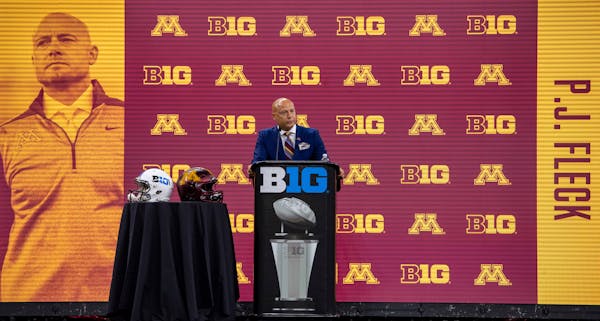INDIANAPOLIS – A palpable sense of excitement was present Thursday as coaches and players from seven of the 14 Big Ten teams gathered on the Lucas Oil Stadium turf for the opening session of the conference's football media days.
Sure, all involved were happy that the season is quickly approaching and showing promise of emerging from a COVID-19 cloud. But going hand-in-hand with the excitement was the realization of newfound financial freedom for college student-athletes.
On July 1, the NCAA ended its restrictions on college athletes making money off their name, image and likeness. The "NIL'' development, plus the 9-0 beatdown the NCAA received in the Sullivan vs. NCAA Supreme Court decision, are among recent developments that have shifted the power away from administrators and to the athletes.
"We're at an inflection point in college athletics,'' Big Ten Commissioner Kevin Warren said. "So, whether it's name, image, and likeness, whether it's the Austin case, whether it's potential college football playoff expansion, whether it's schools from one conference joining another conference, these are the kind of issues that we all will be dealing with here this year and for many years in the future.''
It's the right move at the right time, according to Gophers running back Mohamed Ibrahim.
"It's very important,'' Ibrahim said, "It's the next right step for the college athlete.''
On Thursday, Minneapolis-based Team IFA tweeted that Ibrahim, the reigning Big Ten running back of the year and a preseason All-America selection by many publications, has joined the marketing and consulting company. Ibrahim's teammate, quarterback Tanner Morgan, already had an agreement with the Cameo video messaging service.
Their coach, P.J. Fleck, is all for it.
"It's tremendous,'' Fleck said. "Our location, the Twin Cities area … this isn't a small, little college town. We have businesses galore. … We can't be a part of organizing [player deals], but they have all these resources at their disposal, at their fingertips. There's no Minnesota state law yet, so we have to be able to follow the NCAA, and obviously the University of Minnesota guidelines. But this is awesome that players get to now benefit.''
Fleck's coaching colleagues in the Big Ten mainly agreed. Nebraska's Scott Frost pointed to his team's fan base in a state that does not have a major league professional team.
"Nebraska's uniquely positioned to take advantage of it, just because of the passion surrounding Nebraska football,'' Frost said. "We're the only show in town, we have fans all over the country and all our eyes are on us in the state of Nebraska.''
With the newfound freedom comes responsibility, and Ibrahim said that information from Minnesota's athletic department has been helpful.
"It's important to have extra money in your pocket but understand there's an educational curve,'' Ibrahim said. "We're the first ones to have a crack at it, but the freshmen and sophomores are going to have their opportunities to learn and see our mistakes and see what they can do better in the future.''
Added Fleck, "You don't want a player going to jail for tax fraud. There's a lot of things that they never had to worry about before that now they have to worry about.''
Michigan defensive end Aidan Hutchinson dove head-first into the NIL pool, and he's found there are positives and negatives.
"Right when it happened, I was getting involved. It was pretty exciting at first,'' Hutchinson said. "Two weeks later, people are hitting me up and it's like, 'I really don't want to deal with any of that.' My parents have been critical in helping me. ... It reached one moment where I kind of felt a little bit tired of it. I just want to play ball.''
With a no federal NIL legislation and states having differing laws, the NIL landscape has a bit of a Wild West feel to it. Northwestern coach Pat Fitzgerald stressed caution and education.
"It's incumbent on us to educate the players,'' Fitzgerald said. "… Right now, there's a lot of head coaches getting on a dais and singing a bunch of songs, and they have no idea what they're singing, 'We've got the greatest NIL.' They're all full of it. Nobody knows what they're doing. They're all faking it, and I'll be the first to admit it.''
Still, the athletes are enjoying the freedom.
Gophers defensive end Boye Mafe said he hasn't entered into any NIL agreements yet, but he likes the opportunity athletes now have. "To be the pioneers, the first people through it is great,'' Mafe said. "… To see the people who were in college way before me and to see the things they fought for coming to fruition is beautiful.''
Analysis: Scottie Scheffler comparisons with Tiger Woods is a tribute to both
Federal appeals court overturns West Virginia transgender sports ban

Official who helped MSHSL on pioneering ventures dies at 89

Twins demoting strikeout-prone Wallner to St. Paul

